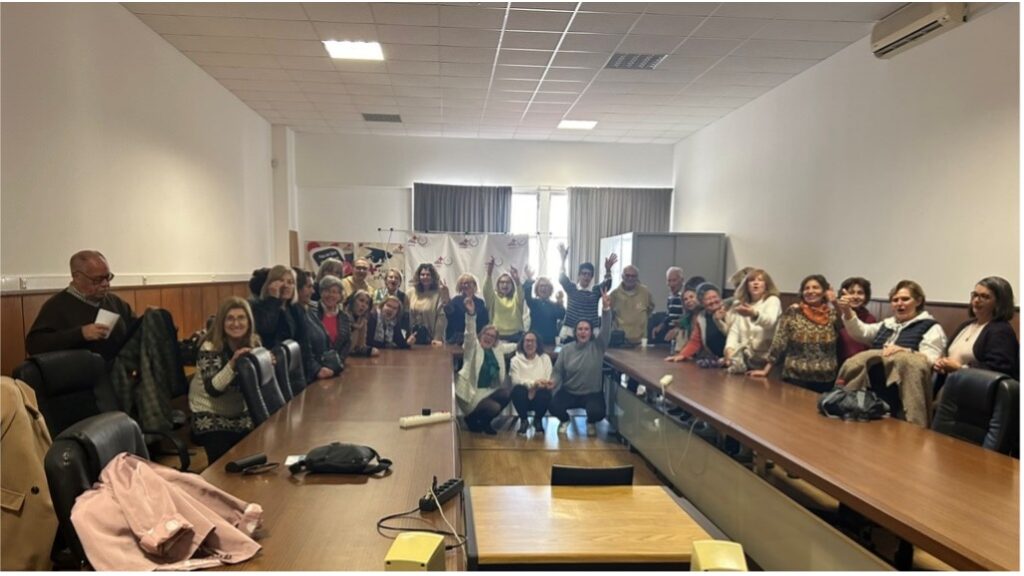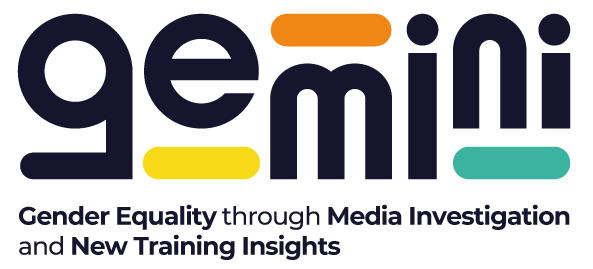GEMINI at Faro’s Senior University
By Alexandre Condeças, December 11 2024
Faro’s Senior Academy is a project of the Faro-Loulé delegation of the Portuguese Red Cross. It began in 2016 and currently serves over 200 alumni. It offers a diverse curriculum, ranging from subjects such as History, Philosophy and Economy to Handmade Embroidery, Theatre and Gymnastics, always according to the seniors’ interests and community participation.
The Academy’s mission, outlined in its presentation materials, is to “value older adults, promote their connection to local social dynamics, provide meaningful activities, and combat isolation.” These goals are in close alignment with the World Health Organization’s emphasis on “active aging,” a key focus during the United Nations Decade of Healthy Ageing (2021–2030).
On November 21st, 2024, GEMINI’s WP2 team was invited by Professor Cátia Martins, from the University of Algarve and volunteer since 2017 in the Senior Academy, to present their project to a group of over 30 alumni. The session focused on gender inequality, stereotyping, and the cultural and social forces shaping these phenomena.

1. Icebreakers and introductions
The session began with icebreaker activities designed to foster a welcoming atmosphere. First, attendees were encouraged to join in a group dancing activity inspired by a music video. This was followed by “Who Am I?” where – after the GEMINI team members introduced themselves – alumni were asked to do the same. The goal was to share some personal stories, building rapport with GEMINI’s team and with each other, reinforcing the university’s ethos of connection and community.
Following this, the presentation outlined GEMINI’s objectives, including the project’s geographic distribution, target groups, rationale and data collection methods, and long-term goals. Participants were also presented a brief “tour” of the GEMINI Educational Toolkit Platform.
2. Key Concepts and Discussion
After presenting GEMINI, a more interactive segment began with a clip from Normal People (extracted from episode 1, depicting Marianne and Connell’s first interaction), used to prompt a discussion on traditional gender roles and stereotypes. Reactions varied, with some alumni asserting such roles no longer applied, while others linked the content to personal experiences. Despite initial unfamiliarity with terms like gender roles, participants eventually shared experiences and implicit knowledge consistent with societal expectations for men and women. This provided a natural segue for GEMINI to define these key concepts.
Regarding this activity, it is interesting to point out that Marianne’s portrayal in the clip as a “strong-willed” character evoked mixed reactions, with some perceiving her negatively compared to a “warmer” Connell. This highlighted implicit biases consistent with psychological literature, which suggests that non-stereotypical traits/behaviour in women, specifically regarding warmth and dominance, tend to be more harshly judged than in men (e.g., Williams & Tiedens, 2016; Otterbacher et al., 2017). This underscores the importance of continuing to address these issues.
Next up, participants brainstormed common stereotypes associated with men and women, critically reflecting on their implications. Some attendees seized the moment to expand the discussion to encompass the gender pay gap in Portugal – following recent national news regarding this phenomenon – and related topics like the glass ceiling effect. Others, however, expressed scepticism about these issues.
Finally, the “GenderBread Person” analogy was introduced to clarify distinctions between gender identity, gender expression, sexual orientation, and biological sex. The alumni were asked to match each concept with the correct placement on the illustration, enabling the GEMINI team to address misconceptions and reinforce understanding.
3. The Empathy Map
The session concluded with an adapted empathy map exercise focused on “Marco,” a fictional trans man grappling with identity acceptance and family rejection. While participants found parts of the exercise challenging, they were able to discuss Marco’s emotions and context, shared supportive comments, and related personal stories about similar experiences. This fostered a warm, inclusive environment for the session’s close.
After the session, several attendees approached the GEMINI team with questions about the project. Some also expressed interest in further discussion regarding the topic of gender and gender identity, namely aspects such as non-binary identities, signalling a strong desire to learn more. Although the 90-minute session limited the depth of discussion, the positive engagement demonstrated the importance of exploring gender-related topics with older generations.
Notably, some attendees resisted acknowledging certain issues, such as the pay gap, underscoring the need for further awareness efforts. This initial encounter, however, strengthened connections with both participants and the GEMINI team, paving the way for future collaborations.
Further information regarding Faro’s Senior Academy, including contact details, can be found in https://www.facebook.com/acad.senior.cvpfaroloule/.
References
diariOnline Região Sul. (2024). Universidade para a Terceira Idade tem inscrições abertas. https://regiao-sul.pt/sociedade/universidade-para-a-terceira-idade-tem-inscricoes-abertas/680182.
Otterbacher, J., Bates, J., & Clough, P. (2017, May 6–11). Competent men and warm women: Gender stereotypes and backlash in image search results [Paper presentation]. 2017 CHI Conference on Human Factors in Computing Systems, Denver, CO, United States. https://doi.org/10.1145/3025453.3025727.
Williams, M. J., & Tiedens, L. Z. (2016). The subtle suspension of backlash: A meta-analysis of penalties for women’s implicit and explicit dominance behavior. Psychological Bulletin, 142(2), 165–197. https://doi.org/10.1037/bul0000039.





